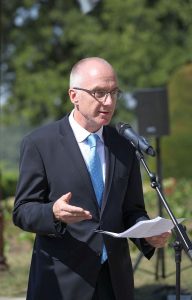Thomas Schieb, the German ambassador to Serbia told the state RTV TV the Belgrade – Pristina dialogue wasn’t dead even after the cancellation of the Paris meeting scheduled for July 1 when the two sides should have met under the Germany – France auspices.

According to Schieb, the idea wasn’t to change the role of the European Union and the format of the talks, but to support the current framework of the dialogue.
“The dialogue is not dead, it is just not happening at the moment,” the ambassador said.
The talks have been on hold since last November after Pristina introduced the 100 percent of import duties on goods from Serbia and Bosnia and had been refusing to suspend or lift them despite pressure from the US and the EU.
Both Belgrade and Brussels say the talks may continue after the tariffs are annulled.
Asked who won and who lost with the cancellation of the Paris meeting, Schieb said the main goal was to resume the dialogue.
“That is our primary aim. We don’t want to have winners and losers in these talks,” he said, adding Pristina’s taxes should be lifted as soon as possible.
Schieb said that since Berlin recognised Kosovo’s independence, the dialogue should aim at the normalisation of relations between Belgrade and Pristina. But, he added that Germany did not predict what the dialogue’s outcome would be.
“The result should be a comprehensive legally binding agreement which would contribute to the regional stability,” he said.
Schieb reiterated Berlin’s stand toward the demarcation of territory swap between Serbia and Kosovo, saying Germany had certain doubts about that and did not think it would be a good solution.
Referring to the Intergovernmental Conference in Brussels on Thursday, the ambassador said the opening of only one chapter in the accession talks with the EU was not bad news for Belgrade, and that the closing of the chapters was more important than the opening, which, he added, depended on merit in reforms and was based on the European Commission’s 2019 report on Serbia’s progress.
“There is a clear European perspective for the Western Balkans,” Schieb said, adding he didn’t see any contradiction between the EU internal reforms and the continuation of the enlargement.
Commenting on the media situation in Serbia, the ambassador said it was not “ideal” and that the implementation of rules and laws was more significant than their adoption.
He added that Belgrade sent the draft of the Media Strategy to Brussels, but that it wasn’t either adopted or implemented in Serbia.